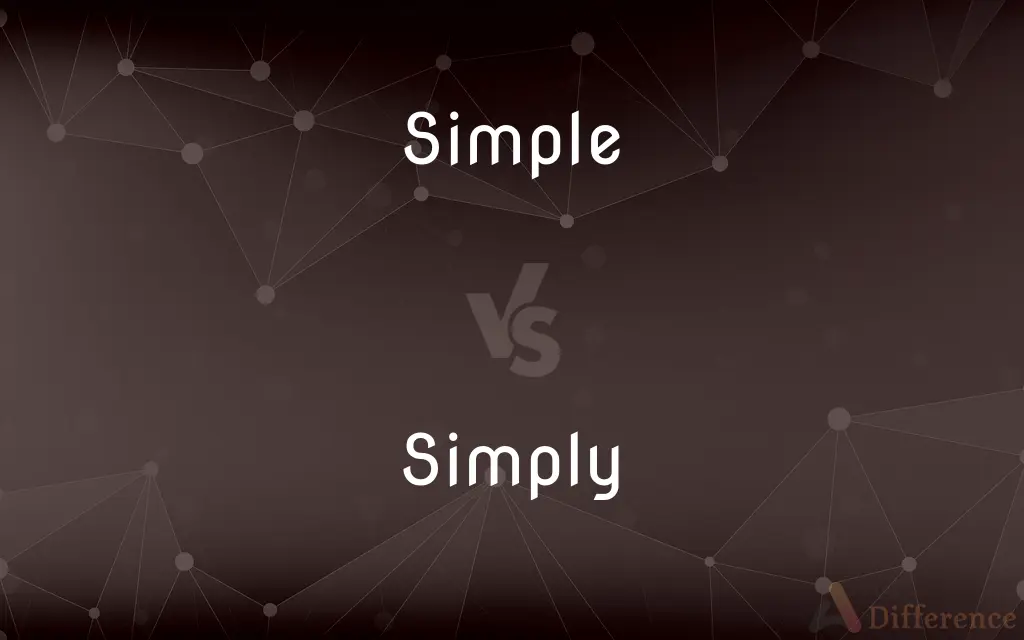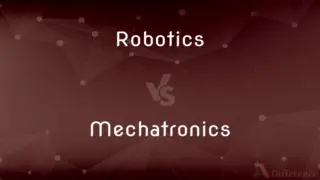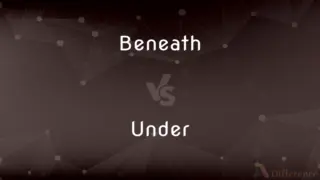Simple vs. Simply — What's the Difference?
By Urooj Arif & Maham Liaqat — Updated on March 20, 2024
"Simple" is an adjective describing something straightforward or uncomplicated, while "simply" is an adverb modifying verbs, adjectives, or other adverbs to express manner, degree, or emphasis.

Difference Between Simple and Simply
Table of Contents
ADVERTISEMENT
Key Differences
The word "simple" is used to characterize nouns as being uncomplicated, easy to understand, or not elaborate. For example, a "simple design" refers to a design that is straightforward and unadorned. In contrast, "simply" functions as an adverb to enhance or modify the meaning of a verb, an adjective, or another adverb, often indicating a manner or degree. For instance, in "simply amazing," "simply" emphasizes the extent of how amazing something is.
While "simple" often suggests a lack of complexity or features, implying something is fundamental or basic, "simply" can suggest clarity, purity, or a straightforward manner. For example, "a simple solution" implies the solution is straightforward, whereas "simply put" suggests that something is expressed in a clear and direct way.
In terms of usage, "simple" can describe tangible and intangible concepts, such as "simple instructions" or "a simple lifestyle." "Simply," however, often relates to the way something is done or the degree to which an attribute is held, as in "she sings simply beautifully," where it modifies how beautifully she sings.
The distinction between "simple" and "simply" also lies in their grammatical roles; "simple" is used to describe nouns and cannot modify verbs, while "simply" does not describe nouns directly but instead modifies verbs, adjectives, and adverbs, adding nuance or emphasis to the statement.
Despite their differences, both "simple" and "simply" share a root in simplicity, often conveying notions of clarity, straightforwardness, and ease, whether in the nature of an object or action, or in the manner of expression or execution.
ADVERTISEMENT
Comparison Chart
Part of Speech
Adjective
Adverb
Function
Describes nouns as uncomplicated or straightforward
Modifies verbs, adjectives, or other adverbs
Usage
To indicate a lack of complexity or features
To express manner, degree, or emphasis
Examples
"a simple plan," "simple ingredients"
"simply put," "simply amazing"
Connotation
Often implies basic, fundamental, or easy
Suggests clarity, purity, or a straightforward manner
Compare with Definitions
Simple
Easily understood or done; presenting no difficulty.
The game's rules are simple and straightforward.
Simply
Merely or just.
It's simply a matter of time before we find a solution.
Simple
Plain, basic, or uncomplicated in form, nature, or design.
She preferred wearing simple dresses.
Simply
In a straightforward or plain manner.
The instructions were simply written, leaving no room for confusion.
Simple
Unaffected; unpretentious.
His simple demeanor was refreshing.
Simply
In a sincere but uncomplicated way.
She loves him simply for who he is.
Simple
Without much decoration or ornamentation.
The simple wooden furniture gave the room a rustic feel.
Simply
Absolutely or completely.
The performance was simply breathtaking.
Simple
Referring to a single element or concept.
A simple truth often carries profound wisdom.
Simply
Used to emphasize a statement.
It is simply impossible to ignore the facts.
Simple
Easily understood or done; presenting no difficulty
A simple solution
Camcorders are now so simple to operate
Simply
In a straightforward or plain manner
She spoke simply and from the heart
Simple
Plain, basic, or uncomplicated in form, nature, or design; without much decoration or ornamentation
The house is furnished in a simple country style
A simple white blouse
Simply
Merely; just
Simply complete the application form
Simple
Composed of a single element; not compound.
Simply
In a plain and unadorned way
Dresses simply.
Simple
Of very low intelligence.
Simply
In an unambiguous way; clearly
Explained the concept simply.
Simple
A medicinal herb, or a medicine made from one
The gatherers of simples
Simply
Not wisely or sensibly; foolishly.
Simple
Used to convey that something is very straightforward
I don't overanalyse. I listen, I like, I buy. Simple!
Simply
Merely; only
It is simply a matter of time.
Simple
Having few parts or features; not complicated or elaborate
A house with a simple floor plan.
Simply
Absolutely; altogether
Simply delicious.
Simple
Easy to understand, do, or carry out
A simple set of instructions.
A simple chore.
Simply
Frankly; candidly
You are, quite simply, the best candidate for the job.
Simple
Having or composed of only one thing, element, or part
A simple chemical substance.
Simply
(manner) In a simple way or state; considered in or by itself; without addition; alone.
Simple
Being without additions or modifications; mere
A simple "yes" or "no.".
Simply
(manner) Plainly; without art or subtlety
Simple
(Biology) Having no divisions or branches; not compound
A simple leaf.
A simple eye or lens.
Simply
(manner) Foolishly; stupidly.
Simple
(Music) Being without figuration or elaboration
A simple tone.
Simply
(focus) Merely; solely.
I was simply asking a question.
Simple
Having little or no ornamentation; not embellished or adorned
A simple dress.
Simply
(degree) absolutely, positively.
That was a simply wonderful dessert.
Simple
Not characterized by luxury or elaborate commitments
Simple living.
Simply
Frankly.
Simply, he just fired you.
Simple
Not pretentious, guileful, or deceitful; humble or sincere
A simple child.
Told us about his achievement in the simplest manner.
Simply
In a simple manner or state; considered in or by itself; without addition; along; merely; solely; barely.
[They] make that now good or evil, . . . which otherwise of itself were not simply the one or the other.
Simply the thing I amShall make me live.
Simple
Having or showing little intelligence, education, or experience
Simple people who have trouble understanding health regulations.
Simply
Plainly; without art or subtlety.
Subverting worldly strong and worldly wiseBy simply meek.
Simple
Lowly in condition or rank
A simple woodcutter.
Simply
Weakly; foolishly.
Simple
A medicinal plant or the medicine obtained from it.
Simply
And nothing more;
I was merely asking
It is simply a matter of time
Just a scratch
He was only a child
Hopes that last but a moment
Simple
Uncomplicated; taken by itself, with nothing added.
Simply
Absolutely; altogether; really;
We are simply broke
Simple
Without ornamentation; plain.
Simply
In a simple manner; without extravagance or embellishment;
She was dressed plainly
They lived very simply
Simple
Free from duplicity; guileless, innocent, straightforward.
Simply
Absolutely;
I just can't take it anymore
He was just grand as Romeo
It's simply beautiful!
Simple
Undistinguished in social condition; of no special rank.
Simple
Trivial; insignificant.
Simple
Feeble-minded; foolish.
Simple
Structurally uncomplicated.
Simple
Consisting of one single substance; uncompounded.
Simple
(mathematics) Of a group: having no normal subgroup.
Simple
(botany) Not compound, but possibly lobed.
Simple
Using steam only once in its cylinders, in contrast to a compound engine, where steam is used more than once in high-pressure and low-pressure cylinders.
Simple
(zoology) Consisting of a single individual or zooid; not compound.
A simple ascidian
Simple
(mineralogy) Homogenous.
Simple
(obsolete) Mere; not other than; being only.
Simple
(pharmaceutical drug) A herbal preparation made from one plant, as opposed to something made from more than one plant.
Simple
A physician.
Simple
(logic) A simple or atomic proposition.
Simple
(obsolete) Something not mixed or compounded.
Simple
(weaving) A drawloom.
Simple
(weaving) Part of the apparatus for raising the heddles of a drawloom.
Simple
(Roman Catholicism) A feast which is not a double or a semidouble.
Simple
To gather simples, i.e. medicinal herbs.
Simple
Single; not complex; not infolded or entangled; uncombined; not compounded; not blended with something else; not complicated; as, a simple substance; a simple idea; a simple sound; a simple machine; a simple problem; simple tasks.
Simple
Plain; unadorned; as, simple dress.
Simple
Mere; not other than; being only.
A medicine . . . whose simple touchIs powerful to araise King Pepin.
Simple
Not given to artifice, stratagem, or duplicity; undesigning; sincere; true.
Full many fine men go upon my score, as simple as I stand here, and I trust them.
Must thou trust Tradition's simple tongue?
To be simple is to be great.
Simple
Artless in manner; unaffected; unconstrained; natural; inartificial;; straightforward.
In simple manners all the secret lies.
Simple
Direct; clear; intelligible; not abstruse or enigmatical; as, a simple statement; simple language.
Simple
Weak in intellect; not wise or sagacious; of but moderate understanding or attainments; hence, foolish; silly.
The simple believeth every word; but the prudent man looketh well to his going.
Simple
Not luxurious; without much variety; plain; as, a simple diet; a simple way of living.
Thy simple fare and all thy plain delights.
Simple
Humble; lowly; undistinguished.
A simple husbandman in garments gray.
Clergy and laity, male and female, gentle and simple made the fuel of the same fire.
Simple
Without subdivisions; entire; as, a simple stem; a simple leaf.
Simple
Homogenous.
Simple
Consisting of a single individual or zooid; as, a simple ascidian; - opposed to compound.
I am a simple woman, much too weakTo oppose your cunning.
He is the companion of the silliest people in their most silly pleasure; he is ready for every impertinent entertainment and diversion.
Simple
Something not mixed or compounded.
Simple
A medicinal plant; - so called because each vegetable was supposed to possess its particular virtue, and therefore to constitute a simple remedy.
What virtue is in this remedy lies in the naked simple itself as it comes over from the Indies.
Simple
A drawloom.
Simple
A feast which is not a double or a semidouble.
Simple
To gather simples, or medicinal plants.
As simpling on the flowery hills she [Circe] strayed.
Simple
Any herbaceous plant having medicinal properties
Simple
A person lacking intelligence or common sense
Simple
Having few parts; not complex or complicated or involved;
A simple problem
Simple mechanisms
A simple design
A simple substance
Simple
Easy and not involved or complicated;
An elementary problem in statistics
Elementary, my dear Watson
A simple game
Found an uncomplicated solution to the problem
Simple
Apart from anything else; without additions or modifications;
Only the bare facts
Shocked by the mere idea
The simple passage of time was enough
The simple truth
Simple
Exhibiting childlike simplicity and credulity;
Childlike trust
Dewy-eyed innocence
Simple courtesy
Simple
Lacking mental capacity and devoid of subtlety
Simple
(botany) of leaf shapes; of leaves having no divisions or subdivisions
Simple
Not elaborate in style; unornamented;
A simple country schoolhouse
Her black dress--simple to austerity
Common Curiosities
Is "simple" used only for physical objects?
No, "simple" can describe both tangible objects and abstract concepts, indicating straightforwardness or a lack of complexity in either.
Can "simple" and "simply" be used interchangeably?
No, because "simple" is an adjective and "simply" is an adverb, their uses in sentences are grammatically distinct.
How can "simply" indicate a straightforward manner?
In phrases like "simply put," "simply" indicates that something is expressed in a clear, straightforward manner without unnecessary complication.
How does "simply" function in negative constructions?
In sentences like "I cannot simply ignore the problem," "simply" emphasizes the speaker's refusal to overlook something in a straightforward manner.
Is "simple" always positive?
While "simple" often has a positive connotation of clarity and ease, it can sometimes imply a lack of sophistication or depth.
Can "simply" change the meaning of a sentence?
Yes, "simply" can significantly alter a sentence by adding emphasis, clarity, or a degree of manner to the action or quality it modifies.
How does "simply" enhance adjectives?
"Simply" intensifies the adjective it modifies, as in "simply wonderful," where it amplifies the level of wonder.
Does "simple" have a technical meaning in any fields?
Yes, in various fields like science and technology, "simple" can describe fundamental concepts or entities that are not compounded or complex.
Can "simply" imply a minimalistic approach?
Yes, in contexts like "I'm simply trying to help," "simply" can suggest a straightforward, no-frills approach to the action.
Can the use of "simple" or "simply" affect the tone of a sentence?
Yes, both can affect tone; "simple" can convey straightforwardness or modesty, while "simply" can add emphasis or clarity, influencing how a statement is perceived.
Share Your Discovery

Previous Comparison
Robotics vs. Mechatronics
Next Comparison
Beneath vs. UnderAuthor Spotlight
Written by
Urooj ArifUrooj is a skilled content writer at Ask Difference, known for her exceptional ability to simplify complex topics into engaging and informative content. With a passion for research and a flair for clear, concise writing, she consistently delivers articles that resonate with our diverse audience.
Co-written by
Maham Liaqat













































